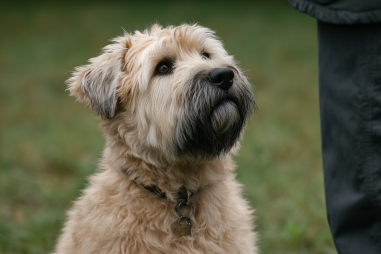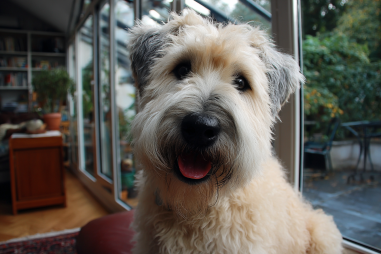Bringing a Soft Coated Wheaten Terrier puppy into your home is an exciting and rewarding experience. These energetic, affectionate dogs are known for their soft, silky coats and friendly personalities, making them wonderful family companions. However, like any puppy, Wheaten Terriers require thoughtful care and attention to grow into healthy, well-mannered adults. In this guide, you’ll find essential tips on everything from preparing your home to managing common puppy challenges, ensuring a smooth transition for both you and your furry friend.
Preparing Your Home for a Wheaten Puppy
Before your Soft Coated Wheaten Terrier puppy arrives, it’s important to create a safe and welcoming environment. Puppies are naturally curious and will explore their surroundings with gusto, so puppy-proofing your home is essential. Remove any hazardous items such as electrical cords, toxic plants, or small objects that could be ingested. Designate a quiet, comfortable spot with a crate or a bed where your puppy can retreat and feel secure. This space will become their safe haven during the adjustment period.
Additionally, gather basic supplies like food and water bowls, high-quality puppy food, chew toys, and grooming tools. Setting up a consistent routine from day one will help your puppy adapt quickly and start building trust in their new home.
Nutrition and Feeding Schedules
Proper nutrition is the cornerstone of your Wheaten puppy’s growth and development. Choose a high-quality puppy food formulated specifically for medium-sized breeds to provide balanced nutrients, including the right mix of protein, fats, vitamins, and minerals. Soft Coated Wheaten Terriers can be prone to food sensitivities, so watch for any signs of allergic reactions such as itching, digestive upset, or ear infections, and consult your veterinarian if concerns arise.
Establish a regular feeding schedule, usually consisting of three to four meals per day until your puppy is about six months old. This frequency helps maintain stable energy levels and supports healthy digestion. Always provide fresh water and avoid giving table scraps or treats that contain harmful ingredients like chocolate, onions, or excessive fat.
Basic Puppy Training Techniques
Training your Soft Coated Wheaten Terrier puppy from the start sets the foundation for good behavior throughout their life. These intelligent dogs respond well to positive reinforcement methods such as treats, praise, and play. Focus first on basic commands like “sit,” “stay,” “come,” and “leave it.” Short, frequent training sessions—about 5-10 minutes each—are ideal to keep your puppy engaged without overwhelming them.
Crate training is another useful technique, as it aids in housetraining and provides your puppy with a personal space to relax. Be patient and consistent, and avoid punishment-based training, which can damage the trust you’re building with your puppy.
Socialization Milestones
Socializing your Wheaten puppy is a critical part of ensuring they grow into a confident, well-adjusted adult. Starting at around 7 weeks of age and continuing through the first few months, your puppy should be gently exposed to a variety of people, other dogs, sounds, and environments. Controlled socialization experiences reduce the risk of fearfulness or aggression later in life.
Arrange puppies’ playdates, introduce them to friendly adults and children, and take them on diverse outings once their vaccinations allow. Always monitor interactions closely, and praise calm, positive behavior to encourage your puppy to enjoy new experiences.
Health Checkups and Vaccinations
Regular veterinary care is vital for monitoring your puppy’s health and preventing illness. Soon after bringing your Wheaten puppy home, schedule an initial veterinary visit to establish their health baseline. Your vet will recommend a vaccination schedule typically including distemper, parvovirus, adenovirus, and rabies vaccines, administered over several visits during the first year.
In addition to vaccinations, discuss parasite prevention, such as flea, tick, and heartworm treatments, as these pests can quickly affect young pups. Regular health checks can also catch early signs of breed-specific issues like protein-losing nephropathy, which some Wheatens may be prone to. Keeping a record of vaccinations, growth, and any health concerns is a good practice for ongoing care.
Grooming Introduction
The Soft Coated Wheaten Terrier’s beautiful coat requires regular grooming to prevent mats and maintain its characteristic soft texture. Introduce your puppy to grooming routines early on, starting with gentle brushing sessions two to three times a week. Use a slicker brush and a comb designed for medium-length, wavy coats.
Bathing should be done as needed, using mild dog shampoos suited for sensitive skin to avoid dryness or irritation. Also, get your puppy used to having their nails trimmed, teeth brushed, and ears checked to prevent infections. Establishing these habits early helps reduce stress for both you and your dog during grooming time.
Dealing with Common Puppy Issues
Every puppy faces challenges as they grow, and Wheaten Terriers are no exception. Some common issues you might encounter include teething discomfort, chewing inappropriate objects, and occasional accidents while housetraining. Address teething by providing safe chew toys and redirecting their chewing away from furniture or shoes.
Consistency is key in housetraining—take your puppy outside frequently, praise successful bathroom trips, and calmly clean accidents indoors. Puppies can also be prone to separation anxiety, especially Wheatens who thrive on companionship. Gradually build up alone time and use toys or calming aids to help your puppy feel secure when you’re away.
Patience, consistency, and kindness will help you navigate these early challenges successfully.
Welcoming a Wheaten Puppy Into Your Life
Caring for a Soft Coated Wheaten Terrier puppy involves preparation, patience, and love. By ensuring a safe home environment, providing balanced nutrition, starting early training and socialization, keeping up with veterinary care, and maintaining grooming routines, you are setting your puppy up for a happy and healthy future. Remember, these spirited dogs thrive on attention and companionship, so engaging with your puppy daily is just as important as the practical care you provide. With the right approach, your Wheaten puppy will grow into a loyal, joyful member of your family.







